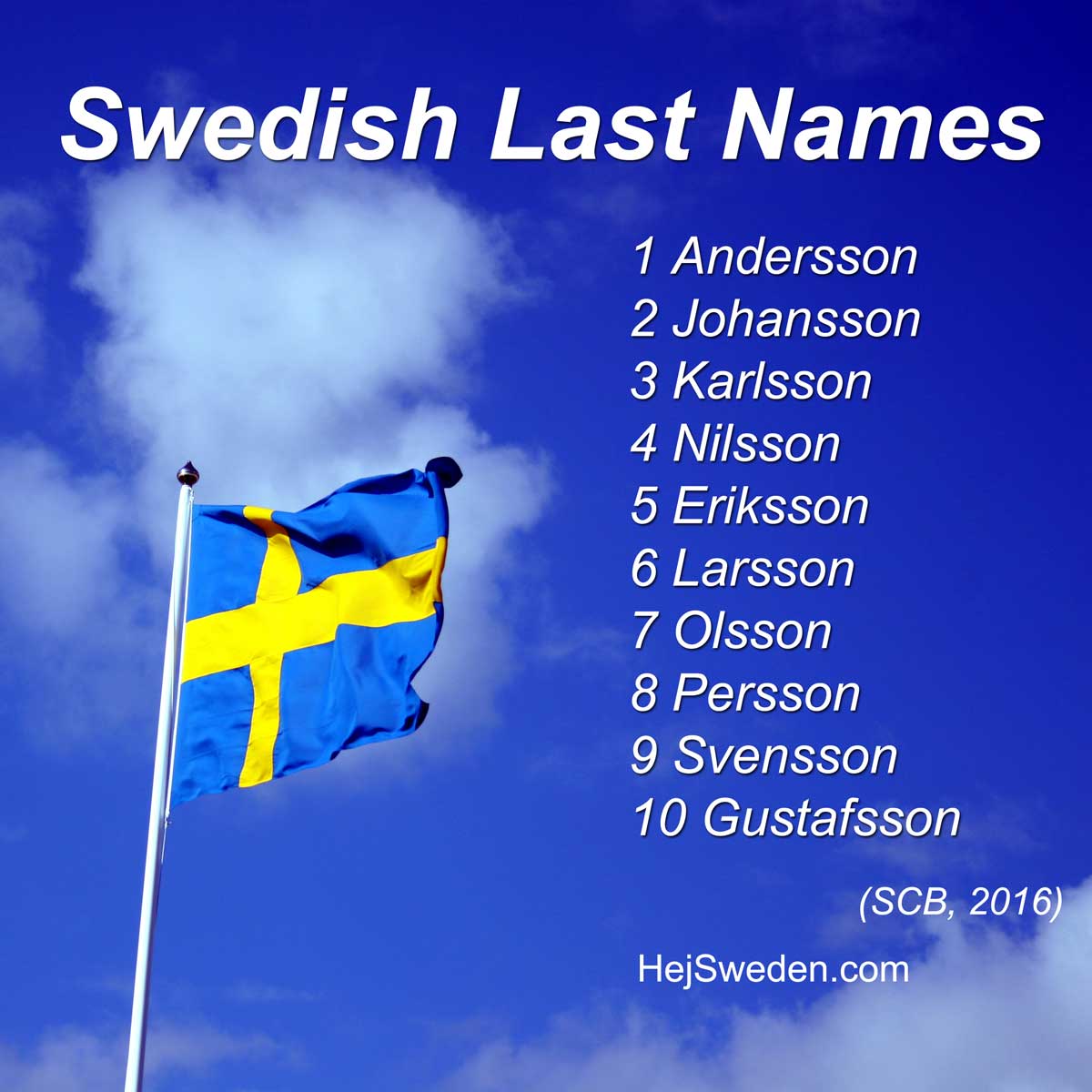Exploring Swedish Surnames: History, Meaning, And Cultural Significance
Swedish surnames play a vital role in understanding the rich cultural heritage of Sweden. They are not just identifiers but also hold a wealth of history and tradition that reflects the societal and familial structures of the past. In this article, we will delve into the origins, meanings, and various categories of Swedish surnames to gain a deeper appreciation of their significance.
Throughout history, the naming conventions in Sweden have evolved, influenced by geography, occupation, and social status. The traditional Swedish naming system has distinct characteristics that differentiate it from surnames in other cultures. By examining these differences, we can better understand how Swedish surnames can provide insights into family lineage and regional identities.
This article will explore various aspects of Swedish surnames, including their historical evolution, the rules governing their formation, and their relevance in contemporary society. Whether you have Swedish ancestry or are simply interested in the subject, this comprehensive guide will provide valuable information and insights.
Table of Contents
- 1. History of Swedish Surnames
- 2. Types of Swedish Surnames
- 3. The Meanings Behind Swedish Surnames
- 4. Regional Variations in Swedish Surnames
- 5. Notable Swedish Surnames
- 6. Tracing Your Swedish Ancestry
- 7. Resources for Further Research
- 8. Conclusion
1. History of Swedish Surnames
The history of Swedish surnames can be traced back to the medieval period when surnames began to emerge as a way to distinguish individuals. Initially, people were identified by single names, often derived from their given name or occupation. However, as populations grew, the need for more distinctive identifiers became apparent.
In Sweden, the use of surnames became widespread in the 19th century, following legal reforms that mandated the adoption of family names. The patronymic naming system, which involved creating surnames based on the father's name, was prevalent during this time. For example, if a father's name was "Anders," his son's surname would typically be "Andersson," meaning "son of Anders."
2. Types of Swedish Surnames
Swedish surnames can be categorized into several distinct types, each reflecting different aspects of Swedish culture and history. Below are the primary categories:
2.1 Patronymic Surnames
Patronymic surnames are derived from the father’s first name, often with the addition of "son" or "dotter" (daughter). This practice was common until the late 19th century and remains a significant feature of Swedish naming conventions. Examples include:
- Andersson (son of Anders)
- Johansson (son of Johan)
- Olofsson (son of Olof)
2.2 Farm Names
Farm names are derived from the names of farms or estates where families resided. These surnames often indicate a family’s connection to a specific location. Examples include:
- Björklund (Birch Grove)
- Hagström (Enclosure Stream)
- Sundberg (Sound Mountain)
2.3 Location-Based Surnames
Location-based surnames indicate the geographic origin of a family. These names often reflect the natural landscape or notable geographical features of an area. Examples of location-based surnames include:
- Nilsson (son of Nils)
- Forsberg (Waterfall Mountain)
- Lindgren (Linden Branch)
2.4 Occupational Surnames
Occupational surnames are derived from the profession or trade of an individual. These surnames provide insight into the roles and trades of families in historical contexts. Examples of occupational surnames include:
- Smid (Smith)
- Falk (Falconer)
- Sköld (Shield Maker)
3. The Meanings Behind Swedish Surnames
Understanding the meanings behind Swedish surnames can offer a glimpse into the history and culture of Sweden. Many surnames are descriptive, reflecting characteristics of the family or their occupation. For instance, "Lindgren" means "Linden Branch," indicating a connection to nature.
Moreover, some surnames carry historical significance, often linked to notable figures or events in Swedish history. As such, researching the meanings of surnames can provide insights into personal and national identity.
4. Regional Variations in Swedish Surnames
Swedish surnames also exhibit regional variations, influenced by local dialects and customs. Different regions may have distinct naming conventions and preferred suffixes. For instance, the southern regions of Sweden often emphasize farm names, while northern regions may have stronger patronymic traditions.
Understanding these regional differences is essential for genealogical research and comprehending the broader cultural tapestry of Sweden.
5. Notable Swedish Surnames
Several Swedish surnames have gained international recognition, often associated with notable figures in literature, politics, and sports. Some notable Swedish surnames include:
- Strindberg (August Strindberg, playwright)
- Gustavsson (Gustav II Adolph, King of Sweden)
- Björk (Björk Guðmundsdóttir, musician)
These surnames not only represent individual accomplishments but also contribute to Sweden's cultural legacy.
6. Tracing Your Swedish Ancestry
For those interested in tracing their Swedish ancestry, understanding surnames is crucial. Utilizing resources such as Swedish church records, census data, and genealogy websites can help individuals uncover their family history. In addition, joining local historical societies or genealogy groups can provide valuable insights and support.
7. Resources for Further Research
Here are some trusted resources for further research on Swedish surnames and genealogy:
8. Conclusion
In conclusion, Swedish surnames offer a fascinating glimpse into the history, culture, and identity of Sweden. From their origins in patronymic naming conventions to the meanings behind farm and occupational names, these surnames are a reflection of the society that created them. By understanding and exploring these names, we can appreciate the rich tapestry of Swedish heritage and its impact on individuals and families today.
If you enjoyed this article on Swedish surnames, please consider leaving a comment, sharing it with others, or exploring more articles on our site for further insights into Sweden's cultural and historical landscape.
Thank you for reading!
We hope you found this exploration of Swedish surnames informative and engaging. We invite you to return for more articles and discussions about culture and heritage from around the world.
Best Thoughts Of The Day: Inspiration For A Fulfilling Life
Wednesday Morning Memes: The Perfect Dose Of Humor To Kickstart Your Day
What Symbolises Love: Understanding The Universal Symbols Of Affection


